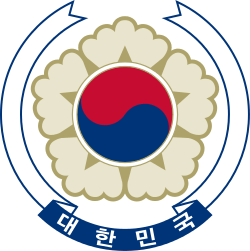Canada–South Korea relations
 |
|
Canada |
South Korea |
|---|---|

Canada–South Korea relations are foreign relations between Canada and the Republic of Korea. Canadian soldiers participated in the defense of South Korea during the Korean War. Full diplomatic relations between Canada and South Korea were established on January 14, 1963. Canada has an embassy in Seoul, and a consulate in Busan. South Korea has an embassy in Ottawa and three Consulates-General, in Montreal, Toronto and Vancouver. Both nations are full members of APEC, OECD and the G20.
History
Contact between Canada and the Republic of Korea date back to the 19th century when Canadians were some of the first Westerners to arrive on the Korean peninsula, a majority of whom were Christian missionaries, though they branched out into other fields of work. Rev. Canadian James S. Gale (1863-1937) created the Korean-English Dictionary which became the first and most essential tool for the scholarly study of Korea in the West; and did an independent translation of the Bible into the Korean language. Another Canadian, Dr. Oliver R. Avison, was the personal physician to King Kojong (1852-1919) and is considered the founder of modern medical knowledge in Korea. Official contact began in 1947 when Canada participated in the United Nations Commission overseeing election in Korea, and Canada formally recognized the Republic of Korea in 1949.
When war broke out between North Korea and South Korea in 1950, Canada sent 26,971 military personnel to the Korean peninsula as part of a United Nations force, the third largest contingent behind the United States and the United Kingdom. Additionally, Canadians saw action in both naval and air forces with eight destroyers, 3,621 naval officers and men, twenty-two fighter pilots and several technical officers; whom were attached to the U.S. Fifth Air Force. Canada continued peacekeeping operations in Korea with the introduction of the Armistice Agreement. Due to the nature of the Korean War as the "The Forgotten War", public awareness has been raised with the dedication of a national monument in 1997 - the Wall of Remembrance in Brampton, Ontario.[1] 516 Canadians died in the war and 378 Canadians lie buried in the United Nations Memorial Cemetery[2] in Busan.
Trade
In 2014, South Korea was the 7th largest destination for Canadian exports the 3rd largest in Asia. In December 2009, Canadian Prime Minister, Stephen Harper, traveled to Seoul on his Asian Tour. The two countries talked on opening further trade relations. Despite suggesting trade advancements in technology and resources, South Korea did not commit to a lifting of the ban on Canadian beef. In October 2011, Canadian Agriculture Minister Gerry Ritz stated that he felt confident that South Korea would reopen the South Korean market to Canadian beef by year's end. The ban has existed since 2003.[3]
Trade relations in the beef market have softened as of early 2012, ending the ban of imported beef. Canada continues to make significant strides in relations with Korea in many areas, including open free trade agreements.[4][5]
On March 11, 2014, Prime Minister Stephen Harper and President Park Geun-hye announced that Canada and South Korea had concluded negotiations on a new free trade agreement.[6][7]
Canadian-South Korean bilateral trade reached (CAD) $10.1 billion in 2012. Canadian export to South Korea were $3.7 billion, while South Korean exports to Canada reached $6.3 billion. Canada's main exports to South Korea were mineral fuels and oils (crude), cereals, wood pulp, mineral ores and meat. South Korea's main exports to Canada were vehicles, electrical equipment, machinery, oils (not crude) and iron/steel.[8]
North Korea
Canada's interests in North Korea are represented through the Embassy of Canada in South Korea.
See also
- Canada–South Korea Free Trade Agreement
- Canada–North Korea relations
- Foreign relations of Canada
- Foreign relations of South Korea
- Korean Canadian
- Asia–Canada relations
References
- ↑ "The Korea Veterans Association of Canada". Kvacanada.com. Retrieved 2016-08-27.
- ↑
- ↑ "Canada sees South Korea lifting beef ban by year-end". Reuters Canada. 2011-10-24.
- ↑ "Harper Government Takes Steps to End WTO Challenge on South Korea's Ban on Canadian Beef Imports". International.gc.ca. Retrieved 2016-08-27.
- ↑ "Archived - Prime Minister Harper speaks with President-elect of Korea, Park Geun-hye - Canada News Centre". News.gc.ca. 2013-01-23. Retrieved 2016-08-27.
- ↑ Government of Canada, Foreign Affairs Trade and Development Canada. "Canada-Korea Free Trade Agreement (CKFTA)".
- ↑ "Canada and South Korea announce they have concluded a free-trade deal". CTV News. 2014-03-11.
- ↑ "Canada - Korea Relations". Canadainternational.gc.ca. 2016-07-05. Retrieved 2016-08-27.
External links
- Canadian Ministry of Foreign Affairs and International Trade about relations with South Korea
- Canadian embassy in Seoul
- Korean Ministry of Foreign Affairs and Trade about relations with Canada
- South Korean embassy in Ottawa
- South Korean consulate in Montreal
- South Korean consulate in Toronto
- South Korean consulate in Vancouver
- the Asia Pacific Foundation of Canada
